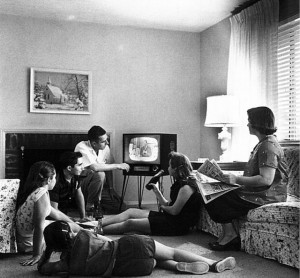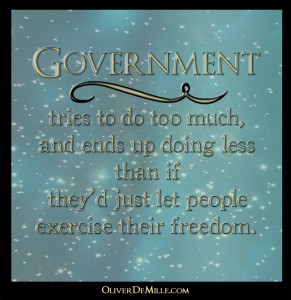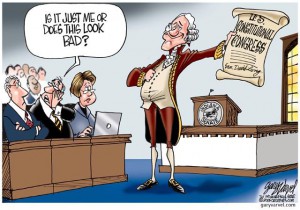An Update on the U.S. Economy
November 19th, 2015 // 2:28 pm @ Oliver DeMille
All in the Family
 A poll by the Pew Research Center shows that, beginning in 2014, the percentage of young women living at home or with family members is the highest since 1940. The number of young men moving home is also growing rapidly, but hasn’t quite topped the 1940 mark yet.
A poll by the Pew Research Center shows that, beginning in 2014, the percentage of young women living at home or with family members is the highest since 1940. The number of young men moving home is also growing rapidly, but hasn’t quite topped the 1940 mark yet.
A significant factor in this shift is that more and more young college graduates are unable to find jobs. Another contributor is that many of the jobs young people do find don’t pay as much as they did for twenty-somethings over the past several decades.
Beyond the college changes, high rent and higher costs of living for everyone are contributing to this change. In short, more young people are staying or moving back home.
Could this be a cyclical return to the multi-generational family households that dominated the 1930s? If so, we would expect to see more grandparents moving in with middle-age children and their families (or vice versa)—and, in fact, this is also occurring. Some eras of history—those with long economic downturns or very slow economic growth—naturally tend toward multi-generational families.
Still Sputtering
Overall, the U.S. economy is still struggling, even though the Great Recession began seven years ago, and even though Washington claims it ended four years ago. But since 2011, we’ve seen only very small growth in the U.S. economy, around 1-2% annually.
For many people, this level of growth doesn’t keep up with the annual increases in their expenses. Many families still feel like the Great Recession never ended, because they seem to be falling further behind. And while the Obama Administration touts the increased numbers of jobs in the past four years, most of these jobs pay much less, and offer fewer benefits (if any), than those so many people lost between 2008 and 2012.
In other words, the recession may technically be over—on paper—but look at the numbers more closely and the economy is still sputtering. Over ninety thousand Americans have now stopped looking for work, so the lower unemployment numbers don’t really mean that lots of jobs—or good jobs—are back.
They aren’t.
The New Economic Normal?
All in all, the Obama Administration has taken the approach that 1-2 percent annual growth for our economy—with lower-paying jobs and more people relying on increased government benefits to survive—is the new normal. The Hillary Clinton and Bernie Sanders campaigns have voiced the same sentiment.
In fact, the Democratic candidates daily make the case that government should offer many more programs (a national $15 minimum wage, free college, increased welfare funds, etc.) so people can get used to making do, even without jobs. Obamacare already did this for health care, though rising costs are causing numerous problems for those who do pay for their own health care.
In contrast, many of the Republican candidates for the 2016 election have argued that we need to get back to 4% annual growth or much, much higher. Whether any of the candidates can win in 2016, and then actually do something to significantly boost the economy, remains to be seen.
We may well be at a national crossroads. If we follow the Democratic path, we’ll increase taxes and depend more on government to help families make ends meet. And paying the bills will be increasingly difficult.
If we adopt the perspective of some Republicans that we really can reboot the economy and spur 4%, 6%, or even higher growth, we can restart the American Dream for the current and next generation. But can any of the Republican candidates actually do it? Only time will tell. At least some of them are trying.
What Actually Works
Let’s be clear. Governments don’t spur economic booms. Entrepreneurs, small businesses, and big businesses that expand and hire do. But when the government regulatory burden and tax rates are as high as they are right now, it’s going to take some government action to free up the economy and incentivize more entrepreneurs and businesses to take action toward major growth.
As for the trillions of dollars held by U.S.-based corporations abroad, the government needs to bring our tax rates down to the point that it makes sense to bring this money back home to the U.S. economy. So, yes, the free economy needs real relief from government right now.
The next election could make all the difference. We’ll either reinforce the Obama legacy and put more people into low-paying (or no) jobs and onto government benefit rolls, or we’ll reboot the economy by freeing it up and incentivizing free enterprise growth, hiring, and expansion.
These are two very clear, opposite directions, and only one of them even has the chance of benefiting American freedom and prosperity in the years ahead. Our economy is at stake.
Category : Blog &Citizenship &Community &Culture &Current Events &Economics &Education &Family &Generations &Government &History &Leadership &Liberty &Politics
Obama’s (Disastrous) “Small Stick” Foreign Policy Doctrine
October 15th, 2015 // 12:51 pm @ Oliver DeMille
Putin, Iran and Our Escalating National Security Problem
I. The Disaster
 In the last few weeks, Putin has rapidly reversed many of the major gains Reagan garnered for the United States when he faced down the USSR in the Cold War. Amazingly, Russia is now arguably the major power in the Middle East, having moved significant military assets into Syria and created an alliance between Syria, Iran, and now even Iraq.
In the last few weeks, Putin has rapidly reversed many of the major gains Reagan garnered for the United States when he faced down the USSR in the Cold War. Amazingly, Russia is now arguably the major power in the Middle East, having moved significant military assets into Syria and created an alliance between Syria, Iran, and now even Iraq.
This is incredibly big news. A month ago many people were deeply worried about the rise of nuclear Iran; today major nuclear power Russia is bombing U.S.-backed rebels.
Things just got a lot worse.
The Rise of Russian Power
Consider the strategic upgrade for Russia, which is the world’s second largest producer of oil in the world over the past 10 years, now quickly spreading its influence in the oil rich regions of the Middle East. Russian jets and helicopters are now flying daily maneuvers in the area, near 5 of the top 10 oil producing nations in the world (Saudi Arabia, Iran, UAE, Iraq, Kuwait). And the Russian navy has proven its eagerness to act in the area as well.
This at the same time that the Obama Administration’s stunningly weak foreign policy has significantly reduced U.S. influence in the area. In a very real sense, the U.S. has lost the Middle East to Russia as much as it lost Vietnam and North Korea to Russian and Chinese influences in past decades. As David Brooks put it in The New York Times: “3 U.S. Defeats: Vietnam, Iraq, and Now Iran.” (August 7, 2015) And that was written before Russia’s latest aggression.
Imagine the situation if U.S. power continues to weaken, Russian dominance in the region continues to increase, and Putin’s administration gains even more influence over the control and price of world oil. Like it or not, this is a major issue; yet the Obama Administration continues to defend its recent agreements with Iran and its general downgrade of U.S. military strength.
II. Background
 This new reality has an interesting backstory. Listen to a Republican presidential debate, and you’ll hear a chorus of criticism toward the Obama Administration’s foreign policy and national security record. Most Americans—on both the Left and the Right—tend to chalk such rhetoric up to political bickering.
This new reality has an interesting backstory. Listen to a Republican presidential debate, and you’ll hear a chorus of criticism toward the Obama Administration’s foreign policy and national security record. Most Americans—on both the Left and the Right—tend to chalk such rhetoric up to political bickering.
But what some voters don’t realize is that President Obama is a Woodrow Wilson-style diplomat, not an adherent of realpolitik. Whether regular citizens understand this or not, it has serious ramifications for all of us, many of them dangerous for the United States.
Wilsonian diplomacy is based on the idea that agreements made between nations will be honored by both sides. Negotiate, discuss, compromise, then sign a mutual deal. And—Voila!—your work is done.
In this worldview, words are the main thing. You can talk your way out of, or into, almost anything. Once the talking is done, it’s all peachy. “Peace in our time!” Neville Chamberlain announced, sure that the words and paper agreements had done the job. Churchill scoffed.
Where Reagan famously quipped “Trust, but Verify,” the Wilsonians prefer a different approach: “Trust, Trust, Trust.” And the corollary: “Talk, Talk, Talk.” Indeed, they often label a “Trust but Verify” strategy as too aggressive, even warlike. “Give peace a chance,” they demand. And, on face value, that’s a good idea. But without follow up, without effective verification and a strong military, even the best “talk” often evaporates in the face of reality.
Many nations break their agreements. Iran has done so repeatedly. The same is true of Iraq and Syria. Not accounting for this in a negotiation with them is tantamount to national security malpractice.
In contrast to Wilsonian negotiations based primarily on hope and talk, realpolitik argues that nations act for their own national interest, and that aggressive enemy nations are ultimately limited only by actual power. The American framers pitted power against power, governmental branch against branch—in order to curb the abuses they knew were inevitable. Similarly, many commercial contracts openly include exit plans and establish specs for arbitration for the breaches, misinterpretations and misunderstandings that can and do sometimes arise.
In international affairs, realpolitik has a much more effective history than Wilsonian idealism. (The word “idealism” isn’t a criticism; Wilsonianism is actually called “idealism” by many political scientists and historians.) The only Wilsonian presidents in the past century were Wilson, Carter, and Obama. All three left international chaos in their wake.
Specifically, in our time, President Obama has taken a “words and trust” approach to:
- Syria (Assad must go, and crossing the “red line” of using chemical weapons will not be tolerated)
- the Crimea and Ukraine (you cannot invade other countries in the 21st century, Russia)
- Iran (it must come clean on it’s nuclear program, or we won’t make any deal)
- ISIS (we will downgrade and destroy it), and China (I’ve indicated that they must stop engaging in cyber attacks on us, and they agreed).
Really? All of these words by President Obama turned out to be false. All of them. But many Americans aren’t very surprised. After all, such words mirrored certain domestic promises: e.g. If you like your doctor, you can keep your doctor.
Except: you can’t.
And:
- Syria’s use of chemical weapons was tolerated with no significant response.
- Russia was allowed to invade Crimea.
- Now Russia is reinserting itself in Syria, Iran, Libya and Bagdad at pre-1973 levels, foreshadowing major increased conflicts ahead. Syrian refugees are fleeing by the millions. Iran didn’t have to come clean—despite President Obama’s tersely delivered words—and it got almost everything it wanted in the negotiation anyway.
- ISIS hasn’t been downgraded or destroyed. Indeed, it is still growing, and emboldened by all this U.S. weakness, the Taliban is once again stepping up its operations. For example, on September 29, the Taliban attacked and took control of the first major city (Kunduz) it has overtaken since 2001. On top of these serious developments, Putin’s first choice of targets in Syria was U.S. backed rebels. Seriously.
In short, President Obama’s Wilsonian words aren’t working. At least not in the real world.
“Peace Through Weakness” isn’t even a bumper sticker. It’s just plain stupid.
III. The Real Strategy
 And let’s be clear. This is not, as some Republican politicians claim, a case of incompetence in the Oval Office. If we’re honest, we have to admit that Barack Obama is one of the most effective politicians in American history. Just look at the evidence:
And let’s be clear. This is not, as some Republican politicians claim, a case of incompetence in the Oval Office. If we’re honest, we have to admit that Barack Obama is one of the most effective politicians in American history. Just look at the evidence:
- He got Obamacare passed, despite the fact that a large majority of the nation dislikes it.
- He pushed through the Iran deal, even though, again, most of the nation thinks it’s very bad for America.
- He got the debt limit raised repeatedly, even in the face of Republican majorities in both the House and Senate.
- He also led numerous, significant budget increases and massive growth of the federal government.
- His drive to increase the size and scope of the federal government has hardly been stopped by the flaccid speed bump that is the Republican opposition. To date, more has been added to the national debt under President Obama’s watch than during all the presidents before him combined.
In short, this President knows how to get things done. When he ran for office, he had a campaign quiver full of domestic goals—and we’ve seen many of them realized. Not a kinder, friendlier Washington, certainly, but many of his other objectives.
Concerning foreign policy, his main purpose was to stop exporting American exceptionalism and make the U.S. just another industrialized nation—not a superpower, but just another country; you know… like France, maybe, or Japan. In many measures, he’s accomplished this as well. In the next sixteen months of his tenure, he’ll likely do even more.
In fact, when asked on 60 Minutes why his foreign policy has been weak, he responded that is hasn’t been weak, that it has in fact been strong. When pushed on what he meant by this, he noted that his words about global climate change have been very strong indeed.
The truth is, I think this is exactly where his head is. Strong foreign policy to him means talking strongly about things like fighting climate change and lecturing Syria about chemical weapons. Wilsonian words.
In other words, this President did exactly what he meant to do with our foreign policy. As a result, we live in a much more dangerous world. This gutting of our national defense will probably be his biggest and most enduring legacy.
Putin, clearly, has gone the opposite direction. As has China. And Iran. Syria too. And many others.
As bad as this all is for the U.S., imagine how Israel must feel.
IV. Alternatives
 Our overall foreign policy goals are a deeper topic than we have time to fully develop here. Yet it is worth mentioning the highlights. Some argue that the U.S. should happily stay out of the Middle East, and let the various radical Islamic groups fight it out amongst themselves. There is a lot of merit to this strategy. Supporting Iraq against Iran in the 1980s resulted in the extremities introduced by Saddam Hussein. Likewise, intervening to remove Saddam and trying to create a more pro-Western Iraqi government resulted in a power vacuum that has helped ISIS.
Our overall foreign policy goals are a deeper topic than we have time to fully develop here. Yet it is worth mentioning the highlights. Some argue that the U.S. should happily stay out of the Middle East, and let the various radical Islamic groups fight it out amongst themselves. There is a lot of merit to this strategy. Supporting Iraq against Iran in the 1980s resulted in the extremities introduced by Saddam Hussein. Likewise, intervening to remove Saddam and trying to create a more pro-Western Iraqi government resulted in a power vacuum that has helped ISIS.
But sitting back and watching Putin essentially take over Crimea and Syria, establish Russian military bases in the Middle East, fly Russian aircraft and drones in droves around the region, and establish a new axis alliance (with Iraq, Iran, and Syria all working with—and to a certain extent, for—Russia), is a whole different matter. If Russia turns its eyes toward controlling world oil prices and revenues (and this has already begun), the consequences will only destabilize the entire region and could drastically hurt the U.S. economy.
In a stroke, Putin has managed to sweep in and direct much of the $150 billion Iran-deal U.S. payout to Iran in the direction of Russian and Chinese weapons and infrastructure. Moreover, events in Europe, relationships between China and Russia, and Russian-American relations are quickly—and dramatically—becoming more dangerous. Putin simply moved into the Middle East without announcement or fanfare and took over. The White House was, and remains, shocked.
When Russia invaded and took Crimea, President Obama responded with words (of course) of censure, and Western sanctions. The President also called Russia a “regional power,” basically limited to influence in Eastern Europe. He was pointed in his explanation that Russia is no longer a global power, just as he recently called ISIS the jayvee team. But under Putin’s leadership, this “regional power” took over Syria almost overnight (cheaply and easily) and then got Iraq and Iran to join the alliance.
However you feel about American intervention abroad, the result of these developments is a major downgrade to our national security. It’s one thing to avoid getting caught in a Middle Eastern quagmire; but it’s an entirely different thing to turn the reins of power over the Middle East to Putin’s Russia. And it’s even worse to do this while simultaneously downgrading the U.S. military year after year. Not only has the Obama Administration’s policies hurt national security, they’ve significantly downgraded our national defense as well.
V. The Road Ahead
Let’s now turn our attention to briefly considering the bigger picture. We have a serious set of problems ahead. The following are potential existential crises for the United States, meaning that one or more of them will almost surely threaten our very national survival in the years ahead:
- ISIS
- Terrorist Attacks in U.S.
- Russia
- China
- Nuclear North Korea
- Iran
- Russia’s Expansion and Oil Domination in the Middle East
- Economic Recession—or Worse
Even something as simple as continued economic stagnancy could have a hugely negative impact on our families, standard of living, and our children’s future. None of these problems are likely to just go away, no matter how many Wilsonian words our leaders multiply. America will need to wisely consider, plan, and take effective action to deal with all of these major challenges.
On the issue of defense, without a significantly re-strengthened military, the United States is in serious trouble. I’m not by any means suggesting that we need as many interventions as the two Bush presidents felt determined to engage, but a weak military is not the right path to American success. And big words from the White House about how America will use its power–followed by capitulation whenever a foreign enemy ignores the President and attacks our interests with no consequence except more words–isn’t the right course either.
The Obama legacy may well go down in history as the era of “Speak Loudly and Carry a Small Stick.” Again, the President seems genuinely annoyed that he has to deal with foreign issues. We can expect the problems to grow in the months ahead—not just in Eastern Europe and the Middle East, but elsewhere as well.
 Whoever replaces Barack Obama in the Oval Office will have his/her hands full. It was bad enough when Bush left office, leaving massive problems in Iraq and Afghanistan, and an escalating face-off with China–not to mention the beginning of the Great Recession in 2008.
Whoever replaces Barack Obama in the Oval Office will have his/her hands full. It was bad enough when Bush left office, leaving massive problems in Iraq and Afghanistan, and an escalating face-off with China–not to mention the beginning of the Great Recession in 2008.
But let’s be honest: Things are much worse now.
The tinderbox only needs a spark.
Category : Blog &Citizenship &Constitution &Culture &Current Events &Economics &Featured &Foreign Affairs &Generations &Government &History &Leadership &Liberty &Politics
Beware the “Institutionalists”
October 5th, 2015 // 6:44 pm @ Oliver DeMille
by Oliver DeMille
Too Much
 The word “Institutionalist” keeps popping up in the worst places. It appeared when the Supreme Court upheld Obamacare, and the swing vote came from Chief Justice John Roberts. When asked why this Republican appointee would side with justices from the Left, the response was that Roberts is an “Institutionalist”.
The word “Institutionalist” keeps popping up in the worst places. It appeared when the Supreme Court upheld Obamacare, and the swing vote came from Chief Justice John Roberts. When asked why this Republican appointee would side with justices from the Left, the response was that Roberts is an “Institutionalist”.
This means that his primary focus is maintaining or increasing the status and historical legacy of the Court.
Let’s be clear. The central point of Court “Institutionalists” isn’t about providing justice. Nor is it making sure the Constitution is most effectively applied. It’s not even about winning for the principles of freedom.
All of these are important, of course. But the main focus of “Institutionalists” comes down to keeping the institution of the Court as impressive as possible.
Is this really the right top goal for a Chief Justice?
When Speaker of the House John Boehner announced his resignation, he was asked why he didn’t powerfully take on President Obama’s agenda, use every possible tool to reverse Obamacare, or effectively fight against other negative liberal programs. He answered that these things weren’t really possible without too much battling, and that as Speaker he had the responsibility to protect the institution of the House.
Many in the media called him an “Institutionalist,” one whose main goal is trying to maintain and increase the status of the House. Again, his primary focus wasn’t stopping negative agendas from the Obama Administration. Nor was it reversing Obamacare or the terrible Iran deal. It wasn’t about rebooting the economy, nor did it focus on blocking the horrific practices of Planned Parenthood. Rather, instead of all these things, Boehner’s focus was on Institutionalism.
Is this what we actually want from our Speaker of the House?
Senate Majority Leader Mitch McConnell is another “Institutionalist.” His top focus does not appear to be promoting great conservative polices, or even fighting negative agendas from the Obama White House. It seems to be trying to make the Senate as an institution look as good as possible to the media and the general population.
Is this the right focus for the Senate Majority Leader?
Add this all up, and Institutionalism is a very bad agenda. First, note that approval ratings for Congress are incredibly low, below 10%. It’s almost impossible to get more unpopular than Congress is right now. In other words, if the goal is Institutionalism, those promoting it are failing miserably.
The Split
Second, and more importantly, voters don’t send Congressmen and Senators to Washington to become great “Institutionalists.” It’s not a priority—or even an issue at all—for most Americans. In contrast, voters do send their representatives to Congress to do the things they really care about.
The Democrats seem to get this. Harry Reid and Nancy Pelosi certainly weren’t “Institutionalists” when they were in power. They gave their hearts and souls to fighting for the liberal agendas they believe in and campaigned about—using every possible tool and opportunity. In fact, if no opportunity was available, they found a way to make one. And they got most of what they wanted. The same is true of President Obama.
If only conservative leaders would fight for their agendas with half as much purpose and tenacity as such Democrats. When Republicans are in Congressional and Court leadership, they too frequently stop standing strongly for the principles of freedom and fighting for them with all their might, and instead hide behind the idea of Institutionalism.
But, again, when Democrats lead the Congress and Court, they don’t claim Institutionalism. They set their liberal agenda and go after it with all their will and resources.
The result is that when Democrats win elections, they swing the nation widely and effectively in the liberal direction, but when Republicans win elections, they too often weakly hide behind the concept of Institutionalism and don’t fight strongly for conservative ideals. Predictably, even when Republican voters win, they just watch the nation drift more liberal because their own leaders don’t do what they promised.
In short: We get more liberal when Democrats are in national leadership, and we frequently get more liberal when Republicans are in national leadership. If you want to see more values and policies based on true principles of freedom, we better get new leadership.
And this split isn’t limited to Right versus Left. It dominates the internal workings of the Republican Party as well. The GOP Establishment emphasizes maintaining the institutions of government. Yes, it wants Republicans to lead such institutions, but Institutionalism runs rampant in the Establishment. The words “Establishment” and “Institutional” are basically synonymous.
Purpose
In contrast, many Republicans want government to make major changes and really fix our nation. Reverse the $19 trillion debt (by comparison, it was $9 trillion when President Obama took office). End government deficits. Restore our national security to a much higher level. Reboot the American economy.
We want real change. It is desperately needed.
For most Americans, the institutions we want to flourish and thrive are our families, communities, the U.S. economy, and genuine American freedom. We want our elected officials to stop being “Institutionalists” and instead use institutions like the House, Senate, Court and Presidency to do what these institutions were designed for in the first place—actually help the people.
Anyone who has been in the House, Senate, Court, or other government institutions long enough to passionately care a great deal about the legacy and traditions of that institution, has been there too long. It’s time to vote such officials out of office and replace them with someone new, someone who cares a lot more about really fixing America, the economy, and helping the people than about loving the legacy of some institution.
To repeat: A politician who fawns over and lauds his/her government institution like a college alma mater or his church, has been there too long. The institutions aren’t about groupies and aficionados; they exist to help the people. This is especially true of government institutions.
We should shun institutionalism. That’s not what Washington’s institutions are for. And it’s certainly not why we elect our representatives.
Category : Blog &Citizenship &Community &Constitution &Culture &Current Events &Economics &Government &Leadership &Liberty &Politics
Ron Paul Is the Winner in 2015 by Oliver DeMille
September 18th, 2015 // 7:14 am @ Oliver DeMille
Why the Republican Establishment Is Surprised
(and a bit clueless)
by Oliver DeMille
Shock and Awe
 The current presidential election has left most of the Establishment speechless. They are shocked by the rise of Bernie Sanders, shocked by the success of Donald Trump in the polls, and shocked by the popularity of Ben Carson. “Shocked” may actually be too weak a word. Apoplectic, maybe?
The current presidential election has left most of the Establishment speechless. They are shocked by the rise of Bernie Sanders, shocked by the success of Donald Trump in the polls, and shocked by the popularity of Ben Carson. “Shocked” may actually be too weak a word. Apoplectic, maybe?
The Establishment is also surprised by the struggles of Hillary Clinton, Jeb Bush, Marco Rubio, and Scott Walker—all of whom were widely predicted to dominate this election cycle.
“Why is this happening?” is a popular question on many political news programs right now. Along with: “Will it continue?” “What will happen next?” and “Why are the voters so angry?”
Conservatism 1.0
The answer is fascinating. To get there, let’s start with the roots of the modern conservative movement. Initiated largely by William F. Buckley, Jr. and his colleagues in the 1950s and 1960s,[i] Conservatism 1.0 struggled, persisted, gained support slowly, and then rose to victory with the election and presidency of Ronald Reagan.
The Party of Reagan was based firmly on the view that “liberalism is bad.” In this environment, Reagan’s GOP found itself directly opposed to the Democratic Party of Franklin Delano Roosevelt and his progressive successors.
The ensuing debate pitted conservatism against liberalism in a few direct, simple ways: limited government versus big government, Constitutional originalism versus judicial activism, American exceptionalism versus European style internationalism, and individualism versus collectivism.
Republicans saw conservatism as good precisely because it espoused limited government, strict adherence to the Constitution, American leadership in the world, and individual freedoms. They saw liberalism as bad because it promoted big government, an activist Court, American subordination to international organizations, and widespread collectivism through higher taxes and increased government programs in all facets of life.
This was the battle of Postwar America. And conservatives saw themselves as the Keepers of Freedom and Family Values in this monumental conflict—warriors for the American Dream and the American way of life.
After the financial downgrade of the Soviet Union during the Reagan years and the fall of the Berlin Wall in 1989, the battle lines were slowly redrawn. New superpowers emerged on the world stage, and existing alliances began to unravel. Naturally, during the 1990s the old battles were replaced with new ones, and in the 2000s world and national allegiances were weakened, redirected, and reconceived.
But the hearts of many 20th Century conservatives (and liberals, for that matter), raised and steeped in the old battles, didn’t change.
Conservatism 2.0
 A new cultural movement sprouted in the different soil after 1989. In technology, this shift was exemplified by Steve Jobs, and eventually Elon Musk. In business, the iconic figureheads were Bill Gates and Warren Buffett. And on the political front, the pioneers of a new model were Ross Perot and Ralph Nader, and later Bernie Sanders and Ron Paul.
A new cultural movement sprouted in the different soil after 1989. In technology, this shift was exemplified by Steve Jobs, and eventually Elon Musk. In business, the iconic figureheads were Bill Gates and Warren Buffett. And on the political front, the pioneers of a new model were Ross Perot and Ralph Nader, and later Bernie Sanders and Ron Paul.
Congressman Paul’s contribution to the new brand of conservatism that arose is hard to overstate. For example:
- It replaced Reagan’s 11th Commandment (“Thou shalt not criticize other Republicans”) with a focus on principles of freedom rather than institutional political parties.
- It walked a fine (and frequently uneasy) line between party loyalty and going independent, finally resting on the idea that independence is more important than party—but sometimes it’s possible to get both.
- It called into question widespread U.S. military interventionism.
- It reemphasized the Constitution as a central, literal theme, rather than a mere national symbol.
- It put actual free enterprise above the rhetoric of free enterprise (rhetoric that most Republican presidents had ironically combined with bigger government).
- It appealed strongly to populism—“this is the people’s government, not vice versa.”
- It switched the viewpoint of conservatism from “liberalism is bad” to “government by elite power brokers and their bureaucratic agents is bad.”
Paul himself wasn’t able to convert this revolution into a White House victory, but the revolution occurred nonetheless. And the 7th point of this revolution is perhaps the most important. It animated the Tea Parties, the elections of 2010 and 2014, and it is still growing today.
It also explains the shock of the current Republican Establishment with the ousting of Eric Cantor, the support for Donald Trump, Ben Carson, and Carly Fiorina, and the popularity of Ted Cruz in comparison to Jeb Bush or Scott Walker.
Mitch McConnell, John Boehner, John McCain, Mitt Romney, Jeb Bush, and most of the Republican Establishment are operating as if the GOP is still Reagan’s party. But this is debatable. A large segment of the party is now more aligned with Conservatism 2.0.
Thus the passionate battle now underway for the future of the GOP. And with each passing election cycle, the popularity of Conservatism 2.0 is increasing.
What 2.0 Conservatives Want
To these new conservatives, the idea that “liberals are bad” is SO forty years ago. The real issue now is that “government by elites” is bad.[ii] “The elite class is bad. It is corrupt, and it’s hurting us all. It is hurting America.” In fact: “Corruption is bad. And elites are corrupt.” This viewpoint is growing.
And to members of the new conservatism, Republican elites are just as bad as liberal elites. Many consider them even worse, like modern wolves in sheep’s clothing, claiming conservatism, and gaining support for their candidates and policies by invoking conservatism, while refusing to passionately or effectively fight for it.
It is important to clarify that the Ron Paul revolution didn’t win all 7 of its main themes. The new 2.0 conservatives never warmed up to items 3 and 4, for instance:
3-less U.S. military interventionism in the world
4-more emphasis on the literal words of the Constitution
But, on the other hand, they bought the following principles hook, line and sinker:
1-focus on principles of freedom rather than institutional parties
6-populism: forget “electability” and support the candidate we think will really bring about the changes we want
7-government by elites is corrupt and bad
This tectonic shift put Carson, Trump, Fiorina and Cruz at center stage.
A Question
It remains to be seen if a 2.0 candidate can become the nominee anytime soon. And even more significant is the question of whether a 2.0 president will actually apply item 5 from the list:
5-actual free enterprise is the goal, not just the rhetoric of free enterprise
Such an approach would lead to balanced budgets, reversal of the U.S. national debt, and a high-growth economy spurred by a massive rollback of anti-small business regulation. Right now many 2.0 voters are split. They’re asking themselves if Trump or Fiorina would actually lead a serious downsizing of government—or instead just expand government like past 1.0 conservative presidents.
As for Carson and Cruz, they seem clearly committed to this approach, but 2.0 conservatives wonder if they have the capacity or authentic will to actually pull it off.
If the 2.0 crowd ever coalesces around one candidate, he or she is going to be very hard to beat—in the primaries, and even in the general. A motivated 2.0 nation will be very persuasive among independents, women, and young voters. And 2.0 is very strong in the swing states. But 2.0 conservatives won’t “go for it” if they are at all uneasy about the candidate’s direction or ability. They are, in a sense, playing the long game, and won’t blow their one-shot-at-the-big-house political capital on an also-ran.
The Election
A long primary and general election fight is still ahead, and this war between conservatism 1.0 and 2.0 won’t be easily resolved. It has already turned nasty, and it will probably get a lot worse.
But if 1.0 wins, if Jeb or another Establishment candidate is the eventual nominee, this fight will rage on. Conservatism 2.0 is young, passionate, and has the benefit of a large and growing base. It may or may not get its way in 2016, but all indications are that it will eventually win the war.
When it does, expect the president it propels into the White House to alter American history as significantly and lastingly as the 1.0 movement did with Ronald Reagan.
(Read more discussion on these themes in FreedomShift, by Oliver DeMille)
[i] With significant support by additional voices including Leo Strauss, Milton Friedman, Leonard Read, Friedrich Hayek, Russell Kirk, Richard Weaver, Ludwig von Mises, Ayn Rand, and Margaret Thatcher, among others.
[ii] In comparison, Liberalism 2.0, supported early on by Hobson and Mencken and Keynes, among others, and perhaps most embodied in current events by President Obama (and espoused by Bernie Sanders), frequently operates on the idea that “America is bad.” European social democracy is promoted as the alternative, the ideal, and the goal.
Category : Aristocracy &Blog &Citizenship &Community &Constitution &Culture &Current Events &Economics &Foreign Affairs &Generations &Government &History &Independents &Leadership &Liberty &Mission &Politics &Statesmanship
The Real Crisis of the 2016 Election by Oliver DeMille
September 10th, 2015 // 6:30 am @ Oliver DeMille
“U.S. median income is $42,000 per year, while the European median income is $27,000. That’s close to the average difference in annual income between U.S. high school grads ($28,000) and college graduates ($45,000). And the current elite class wants America to become more like Europe. This explains much of what Washington is doing these days.”
What Is Coming
 There is a serious crisis coming. Most people just hope it won’t come. Their subconscious minds tell them: “If we hope hard enough, and avoid thinking about it, maybe it won’t happen.”
There is a serious crisis coming. Most people just hope it won’t come. Their subconscious minds tell them: “If we hope hard enough, and avoid thinking about it, maybe it won’t happen.”
Sadly, it isn’t quite that simple. The crisis is coming.
What’s the Crisis? Imagine this: It’s the summer of 2017, and we have another career politician in the White House. On the day of the 2016 election, or even earlier, we learned that none of the anti-Establishment candidates were going to win. Instead, the media informed us that the American electorate was putting another regular politician into office.
And since inauguration day, that president has followed a path similar to earlier presidents, from Bush I and Clinton, to Bush II and Obama: the national debt is still skyrocketing, our foreign policy is a disaster, the government is growing, increased regulations attack our prosperity every month, and the Supreme Court is legislating additional policies that hurt the nation.
On top of all this, the mandates of Obamacare are really kicking in now, increasing many small business costs by 30% or more annually—and as a result, those businesses that survive are laying off large numbers of employees. Your family health insurance premiums are up many thousands of dollars a year. The economy is still struggling, with less than a 2% growth rate, and good-paying jobs are increasingly scarce. At least one or two of your close friends or family members have lost their jobs.
In other words, it’s clear that the 2016 election has changed almost nothing. Terrorist attacks are increasing in both Europe and a few targeted attacks in the United States—as Iran uses its new $100 billion dollars to fund such violence. ISIS is still spreading, and China continues to increase its naval presence around the Pacific Rim. Moreover, Putin is becoming increasingly aggressive, not just in Eastern Europe but also in Syria, the North Pole, and the Pacific.
If the new president is a Democrat, there is a strong push to increase taxes and federalize even more state-level programs. If, contrast, if the president is a Republican… well, exactly the same thing is happening.
If we vote for the same kind of candidate we’ve voted for since 1988 (a career politician), we’re going to get the same thing we’ve experienced since…you know…1988. Meaning that career politicians are going to give us the same thing that career politicians have always given us:
Increased government. Very little positive change. A continual slide toward bigger government, higher debts, and decreased individual prosperity and freedoms.
Coming Paths
This is the crisis ahead: More of the same. Except that it’s continually a bit worse, year after year, election cycle after election cycle.
“The definition of insanity,” you remind yourself, “is to keep doing the same thing while expecting different results.” In business, the prime directive is that to actually change an organization, you have to significantly change the leadership. If career politicians keep running the White House, little is going to change. This is true.
It’s frustrating. We don’t want to believe it, because we hope things will be different this time. But each election proves that it’s the reality. Career politicians do what career politicians do. Over and over.
Specifically: whatever career politicians say as candidates, once they’re elected they do what they’ve done before. Count on it. The following presidential candidates are not going to bring much change to Washington:
- Joe Biden
- Hillary Clinton
- Jeb Bush
- Chris Christie (to his credit, Christie is openly promising to do what career politicians do: just more of the status quo)
- Marco Rubio
- Scott Walker
- John Kasich (actually, at least Kasich has balanced two major budgets—the federal budget during the 1990s, and Ohio’s budget while serving as governor; thus, he’ll likely do this again—even if he doesn’t do much else, this is a pretty good thing)
But does anyone actually believe that if Jeb Bush is elected president we’ll reverse the national debt, repeal Obamacare, or seriously send education decisions and funding back to the states, where it belongs? No way.
The above candidates are part of the system; and reaching the pinnacle of the system they’ve spent their lives supporting won’t incentivize them to drastically change things. Whatever your political views, it’s clear that those who’ve made their lives in the system aren’t likely to alter it in any significant way. Period.
The following are a lot more likely to really change things:
- Bernie Sanders
- Carly Fiorina
- Rand Paul
- Donald Trump
- Ted Cruz
- Ben Carson
Say what you want about them, but they aren’t part of the typical Washington Establishment.
If elected, would one of them actually change things?
Maybe. Maybe not. But there is at least a chance.
In contrast, with the first list above, there’s no reasonable, rational expectation of real change.
Part II: What Will the Crisis Look and Feel Like for Americans?
Beyond the question of whether or not real change will come after the 2016 election, a deeper question is this: “If it doesn’t come, what will happen?”
In other words, “Where is our current national trajectory taking us?” First of all, if real change does come, it could take a number of different directions. That’s what change does. Genuine change is almost impossible to predict, because a significant change causes so many additional, cascading, changes.
If anyone on the first list above becomes our next president, I believe we have less than a 1% chance of changing course in a serious way that really shifts our national direction. Even if someone on the second list is elected, I’m convinced we’ll have less than a 40% chance of such a course correction (and 0% if it’s Bernie Sanders).
And let’s be clear: a course correction is desperately needed. If it doesn’t come, where are we headed?
Answer: In the early 1960s, many in the Euro-American elite class adopted the idea that the U.S. was beginning to outpace the nations of Western Europe—economically, technologically, and militarily. Moreover, they calculated that such a divide would be bad for business (specifically the business of the elites, which includes both the economic endeavors of the 1% and also their political influence).
To combat this growing divide, the elites began using their institutional, fiscal, and monetary influence to make the United States more like Europe. They began in earnest by dropping the gold standard in 1971, and providing an influx of elite money into higher education donations and endowments, and simultaneously with increased investment in and ownership of major media outlets.
Influenced by these funds and those who provided them, education began spreading the idea that America should be more like Europe, and the graduates of these programs increasingly dominated the campus scene through the seventies and eighties. By 1987, Allan Bloom decried what amounted to the Europeanized politicization of higher education in his bestselling book The Closing of the American Mind.
Choosing a Dream
Media increasingly reinforced this same message—“America should be more like Europe”—in stories and reports, from the major national newspapers to the Big 3 television networks. Nearly all cable channels and Establishment-supported Internet news outlets followed suit.
Among Establishment policy makers, Samuel Huntington’s writings on “Civilizations” and Francis Fukayama’s “End of History” essays pointed U.S. financial-, domestic-, and foreign-policy institutions (and bureaucracies) in the same direction.
Where does this leave us today? The “American Dream” includes the ideal that each household should achieve home ownership, financial independence (at least by the time of retirement), cars, savings, education for the kids, and a better lifestyle for each additional generation. In contrast, a middle class family in Europe typically lives in an apartment, has fewer children than American families, owns (on average) less than one car, and expects decreasing financial opportunities for coming generations.
To put this in financial terms, the U.S. median income is $42,000 per year, while the Western European median annual income is $27,000.
While it may not appear so at first, these numbers are drastically different—especially if you are applying for a home or vehicle loan, trying to start a business, deciding how many children to have, or funding a child’s college education. Indeed, an American family of three making the European median income of $27,000 a year typically lives in an apartment and has approximately $4,050 a year or less in disposable income. The U.S. median income of $42,000 upgrades the family to a home and $12,180 in annual disposable income.
That’s roughly the same as the average difference in annual median income between U.S. high school grads ($28,000) and college graduates ($45,000). That’s right: the direction of U.S. median income is headed toward less than the average wages of high school grads.
This comparison is not overstated. This is where we’re headed. Of course, the affluent classes won’t suffer this same fate, but a lot more Americans will become part of the struggling class. Just like in Europe.
Who we vote for matters.
If we want real change, we need to vote for something different.
Category : Aristocracy &Blog &Business &Citizenship &Community &Constitution &Culture &Current Events &Economics &Education &Foreign Affairs &Generations &Government &History &Independents &Leadership &Liberty &Politics













